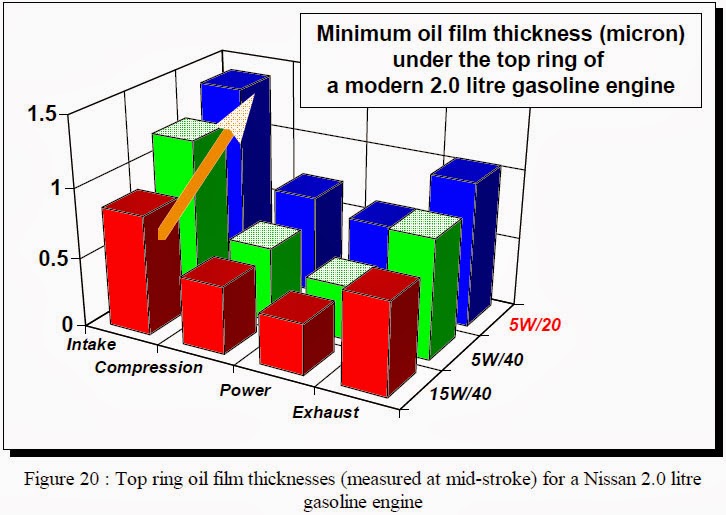Originally Posted By: Gokhan
Originally Posted By: ZeeOSix
This paper gives some insight on how different oil viscosity can effect the minimum oil film thickness (MOFT) and the friction losses in engine components.
http://www.eng.auburn.edu/~jacksr7/SAE2002013355.pdf
The only real benefit of thinner oil is a reduction in shearing friction and therefore power loss, which ties into the main CAFE goal to achieve better fuel economy.
As long as the MOFT is still satisfactory (along with whatever anti-wear additives are at play), the wear should be held down to an acceptable level. Thinner oil results in less oil film thickness for engine components to work with (ie, less "safety factor") before metal-to-metal contact occurs. And as mentioned before, if the engine is heavily stressed to elevate the oil temperature well above the "normal" level, then the oil film thickness suffers even more.
The only benefit of thin oil is fuel economy? Really?
The argument that thicker oil has larger MOFT and less wear and thinner oil has smaller MOFT and better fuel efficiency but more wear is primitive and aims to stall the discussion before it gets anywhere. Besides, it's not even correct.
Where should I begin?
Primitive argument: Thicker the oil, larger the MOFT, less the wear.
Reality: Oil too thick = engine damage, as it can result in oil starvation if clearances are not large enough for the viscosity,
Read this thread about the countless engines that had their bearings damaged by running 10W-60, even though it was recommended by the manufacturer. Going down to 0W-40 corrected the problem.
http://www.m3post.com/forums/showthread.php?t=911030
Primitive argument: Thicker the oil, larger the MOFT.
Reality: Perhaps usually true at the bearings but false in general.
Research by Shell indicates thinner oil results in larger MOFT at top piston rings. The reason is that thinner oil flows faster through the ring gaps:
PDF link for the Shell research article
Primite argument: There is no benefit other than fuel efficiency with thinner oil.
Reality: What about more oil flow with thin oil, which results in more oil reaching critical engine parts?
Reality: What about high oil temperature, which is detrimental to engine parts, and the fact that thin oil runs a lot cooler than thick oil thanks to less viscous friction?
Reality: What about cold engine, in which even the thinnest oil is too thick?
This argument just does not hold any water, that thinner oils are better at high temperature because they flow more and have lower oil temps.
There was a guy on here that i think fell for that argument, and used 0W-20 in his Turbo MX-5, the result was a horrible UOA with very high iron.
GM recomends 15W-50 M1 for their Z06 corvettes when being used on the track, and Ford recomend 5W-50 oils for their sportiest cars.
Just recently i saw a Youtube video where a guy ran Redline 0W-20 in a Subaru BRZ i think, and used it on the track, once the engine was getting hotter and hotter, the engine basically did not have any oil pressure, that could not have done anything good for his engine, had he been using say Redline 5W-30 or 0W-40, His oil pressure would have been better, despite probably having slightly higher oil temps.
models, who am i going to trust more, GM amd Ford or some guy on an internet board trying to convince me otherwise...





